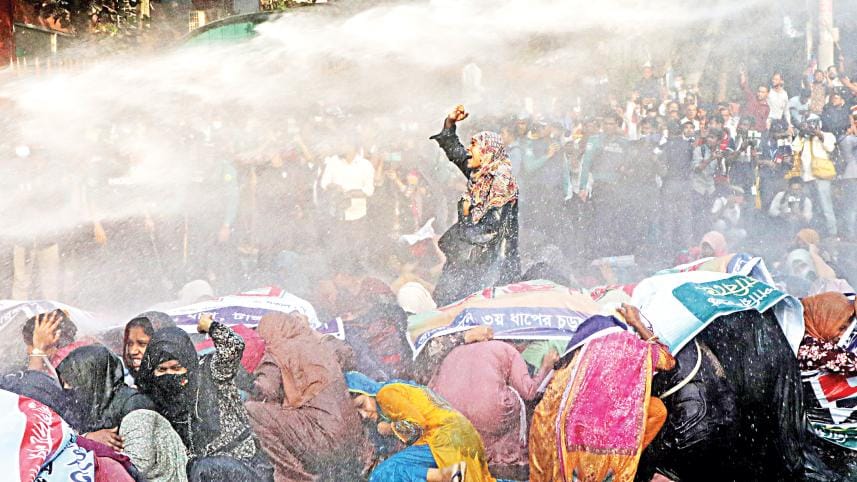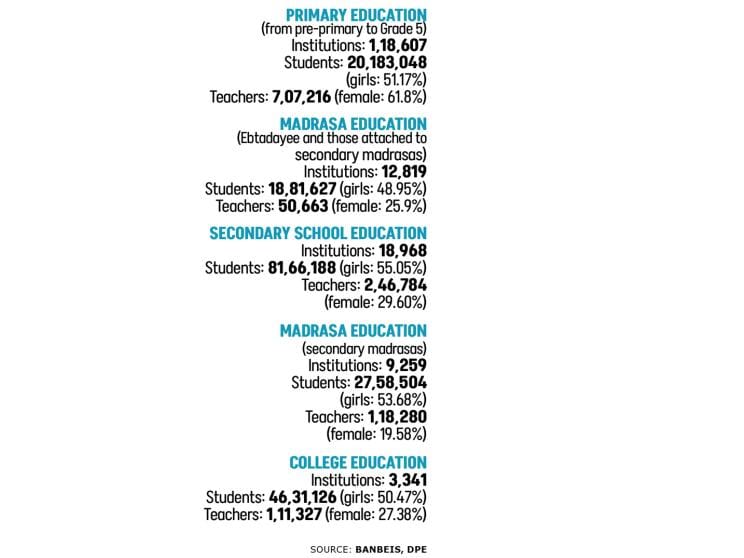Architects of tomorrow overlooked today

On this World Teachers' Day, as we honour those who have lit our paths, we must remember that no nation or society can rise without the persistent labour of its teachers. Teaching is not simply the transfer of knowledge; it is the shaping of character, the sparking of curiosity and the building of resilience in the face of doubt. They stand as both architects and guardians of our future, moulding minds with patience and compassion. Respecting teachers is not about grand gestures; it is about recognising that their sacrifices -- long hours of dedication despite little pay -- form the foundation of our progress. Behind every discovery, invention, or act of leadership stands a teacher who nurtured the spark. As we celebrate this day, let us remind ourselves: respecting teachers means listening to their voices; valuing their wisdom; and standing up for their rights. A society that neglects its teachers writes its own decline, while one that honours them writes its renewal.
They carry the nation's most vital responsibility: shaping young minds and laying the foundation for future generations.
Yet, primary school teachers in Bangladesh struggle to build dignified lives of their own, weighed down by meagre pay and a persistent lack of social recognition -- a reality that not only affects their livelihoods but also undermines the quality of education.
Paid under the National Pay Scale 2015, with no adjustments for surging inflation, teachers say their salaries barely support their families. With inflation now at 8.29 percent, the cost of food, transport, and healthcare has steadily climbed, but their pay has failed to keep pace with the rising cost of living.

"Every month is a struggle. My salary vanishes within 15 days after covering just the basics like rent, food, and my children's education," said Khairun Nahar Lipi, an assistant teacher at Mohammadpur Government Primary School in Dhaka.
Currently, an assistant teacher at a government primary school starts with a basic salary of Tk 11,000 under grade 13, while head teachers begin at Tk 11,300 under grade 12. Trained head teachers receive a higher starting salary of Tk 12,500 under grade 11.

In addition, they receive a house rent allowance -- ranging from 45 to 60 percent of the basic depending on the institution's location -- along with Tk 1,500 for medical expenses, Tk 300 as convenience, and a tiffin allowance of just Tk 200.
Many of her colleagues, Lipi said, are forced to take out loans almost every month just to cover basic expenses. Even a government primary school teacher in Joypurhat's Kalai upazila died by suicide last month, unable to cope with the mounting burden of debt.
"Can you understand our situation? We are a big stakeholder in education, but no one hardly cares about us -- our pain, our agonies," she said.
Adding to their frustration is the lack of social and professional status. Educators, especially the assistant teachers, are broadly classified as third-class employees in the pay structure and often placed on the same grade as clerical staff -- nowhere near bankers or doctors and engineers in terms of respect, status, or pay.
In state-run banks, entry-level positions such as Officer and Senior Officer are placed under the 10th and 9th grades of the national pay scale, with starting salaries of Tk 16,000 and Tk 22,000 respectively. In addition to it, they also get house rent, medical and other allowances.
"Teachers help build the foundation of the very doctors and engineers this nation relies on, yet we're rarely seen in the same light," said Lipi, general secretary of the Bangladesh Primary Teachers Association.
The low pay and declining social status are not personal struggles; they're also changing the future of the profession. Many young, talented graduates are no longer choosing teaching as a first option, while others see it as a temporary job until something better comes along.
"How can we expect meritorious students to become primary school teachers with this salary structure and social status?" Manzur Rahman, a teacher of 19-No Raripara Government Primary School in Kumira of Satkhira.
"Teachers are popularly dubbed as the architects of the nation, but, I think, we are the most overlooked segment of the workforce. Bright students will never choose teaching; they would go for careers that offer better financial security and greater respect," he said.
Educators say their remuneration left them with little choice but to take on private tuitions, coaching centers or other jobs after school hours. Many spend evenings tutoring students just to cover the ever-increasing costs. The extra workload affects their classroom performance and eventually undermines the quality of classroom teaching, they add.
"I teach all day and tutor in the evenings just to keep my family surviving. There's hardly any time to rest, no time for family. It's exhausting, but I have no choice," said a teacher in a state-run school in Dhaka, wishing not to be named.
Bangladesh currently has over 3.83 lakh primary school teachers, the first line of mentors for more than 1.6 crore children in 65,567 government primary schools across the country.
Experts say that unless the government ensures fair pay and dignity for them, its goal of improving primary education will remain elusive.
"If we want quality education, we need quality teachers. It's a simple equation," said noted educationist Rasheda K Choudhury. "But how much are we really doing for our teachers? That remains a big question, especially when we so often see them on the streets, demanding fair pay and dignity."
"We need to invest in our teachers and the outcome of the investment must be visible," said Rasheda, also executive director of Campaign for Popular Education (CAMPE).
KM Enamul Hoque, capacity support and advocacy adviser at the Asia South Pacific Association for Basic and Adult Education, said talented individuals will not join unless the profession is respected and well-paying.
"As the interim government pursues reforms across sectors, it should make teachers' pay and status a key part of the education reform agenda to attract bright graduates."
But better remuneration alone is not enough. "There must also be stronger accountability mechanisms to ensure teachers fulfil their responsibilities," he added.
There is, however, a ray of hope. Following a longstanding demand, the Primary and Mass Education Ministry in July announced that all government primary school head teachers would be upgraded to grade-10.
They have yet to receive the benefits, as the process of updating their pay grade is still underway.
Contacted, Joint Secretary Rebeka Sultana of the School-2 Wing of the ministry said several procedural steps are pending. "The matter is currently with the public administration ministry. Multiple meetings have already been held to finalise it."
Officials expressed hope that the process would be completed soon.




 For all latest news, follow The Daily Star's Google News channel.
For all latest news, follow The Daily Star's Google News channel.
Comments